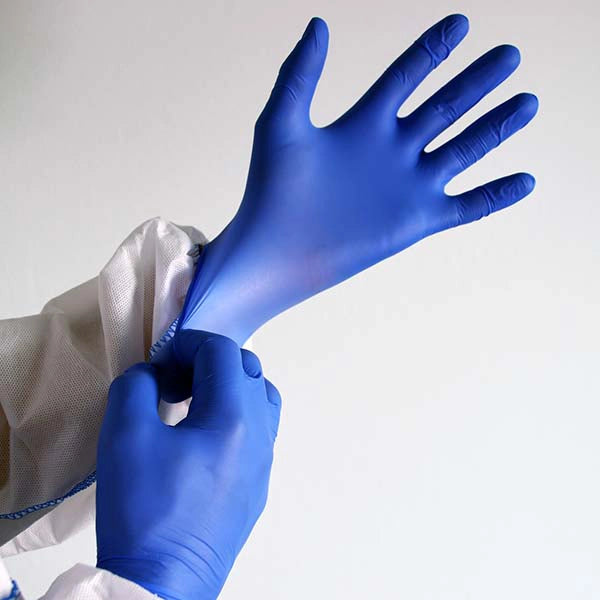If you have eczema, you know how challenging it can be to find gloves that protect your sensitive skin without causing further irritation.
Medical gloves designed specifically for eczema can provide a much-needed solution, offering a barrier against irritants, germs, and chemicals while minimizing the risk of allergic reactions.
In this article, we'll explore the different types of medical gloves available for eczema and help you choose the best option for your needs.
What are Medical Gloves for Eczema?
Eczema gloves are specially designed gloves that protect sensitive skin from irritants while providing a barrier against germs and chemicals. These gloves are typically made from hypoallergenic materials that minimize the risk of allergic reactions and skin irritation.
Check out our Nitrile Gloves for Sensitive Skin Collection and save up to 50% today!
When choosing medical gloves for eczema, it's important to consider factors such as material, fit, and powder content. Selecting the right gloves can significantly reduce eczema flare-ups and improve overall comfort.
Examples of Medical Gloves for Eczema
There are several types of medical gloves suitable for those with eczema, each with its own unique properties and benefits:
- Nitrile gloves: Made from synthetic rubber, nitrile gloves are latex-free, comfortable, and durable. They offer excellent protection against chemicals and are a popular choice for those with latex allergies.
- Vinyl gloves: Vinyl gloves are made from PVC and are latex-free, making them a cost-effective option for individuals with latex allergies. While they may not be as durable as nitrile gloves, they still provide adequate protection for most medical and household tasks.
- Neoprene gloves: Neoprene gloves, made from synthetic rubber, are latex-free, chemical-resistant, and comfortable. They offer a good balance of durability and flexibility, making them suitable for a wide range of applications.
- Cotton gloves: Cotton gloves are made from natural fibers, making them breathable and gentle on the skin. They are often used as liner gloves underneath other glove materials to provide an extra layer of protection and comfort.
When selecting medical gloves for eczema, consider your specific needs and the tasks you'll be performing. Factors such as the level of protection required, the duration of wear, and the presence of any additional allergies should all be taken into account.
5 Best Medical Gloves for Eczema
-
HandCare Black Nitrile Gloves - Exam Grade, Powder Free (4 Mil)
The HandCare Black Nitrile Gloves are crafted from high-quality synthetic rubber, offering a reliable barrier against chemicals, punctures, and abrasions. These gloves are powder-free, eliminating the risk of inhalation or skin irritation caused by powdered gloves.
The 4-mil thickness strikes a balance between durability and tactile sensitivity, making them a versatile choice for various applications. The textured fingertips enhance grip, ensuring precision in handling delicate instruments or performing intricate tasks.
Shop HandCare Black Nitrile Gloves and save up to 50%
- Use Cases: These gloves are ideal for medical professionals, laboratory technicians, and anyone working in environments where exposure to chemicals or infectious materials is a concern. They are also suitable for use in automotive, janitorial, and food service settings, providing robust protection without sacrificing comfort.
2. HandCare Blue Nitrile Gloves - Exam Grade, Powder Free (4 Mil)
These blue nitrile gloves are designed for superior performance and protection. Made from a durable, puncture-resistant nitrile compound, they are free from latex, making them safe for individuals with latex allergies. The powder-free design reduces the risk of contamination, while the 4-mil thickness ensures that the gloves are tough yet flexible.
The gloves feature a beaded cuff for easy donning and removal, and the textured surface improves grip, even in wet or oily conditions.
Shop HandCare Blue Nitrile Gloves and save up to 50%
- Use Cases: Perfect for healthcare professionals, these gloves are excellent for patient examinations, handling biohazardous materials, and performing surgical tasks. They are also ideal for use in food preparation and processing, ensuring hygiene and safety.
3. HandCare Black Vinyl Gloves - Powder Free (3 Mil)
HandCare Black Vinyl Gloves are an economical yet reliable option for situations where durability is less critical. Made from polyvinyl chloride (PVC), these gloves offer a latex-free alternative that reduces the risk of allergic reactions. The 3-mil thickness provides adequate protection for most light-duty tasks, and the powder-free design minimizes the potential for irritation.
The gloves’ loose fit allows for quick changes and easy application, making them convenient for short-term use.
Shop HandCare Black Vinyl Gloves and save up to 50%
- Use Cases: These gloves are well-suited for food service workers, where frequent glove changes are necessary. They are also appropriate for light cleaning tasks, general household chores, and low-risk medical procedures, such as examinations where the risk of exposure to bloodborne pathogens is minimal.
4. ADVANCE Blue Vinyl Gloves - Powder Free (4 Mil)
The ADVANCE Blue Vinyl Gloves offer a step up in durability and protection compared to standard vinyl gloves. At 4 mils thick, they provide better resistance to tears and punctures while maintaining the flexibility and comfort needed for prolonged use.
Shop ADVANCE Blue Vinyl Gloves and save up to 50%
These gloves are latex-free, making them a safe choice for those with latex sensitivities. The blue color helps to easily identify the gloves, which is particularly useful in food processing environments where color-coding is important for safety and compliance.
- Use Cases: Ideal for food service, these gloves are also great for janitorial work, laboratory settings, and other environments where low-risk contamination is a concern. Their powder-free design ensures that they do not contribute to airborne allergens or interfere with tasks that require a clean, residue-free environment.
5. Neoprene Chemical Resistant Gloves
These Neoprene Chemical Resistant Gloves are engineered for the toughest tasks, offering outstanding protection against a wide range of chemicals, oils, acids, and solvents. Made from synthetic polychloroprene rubber, these gloves are highly resistant to degradation, maintaining their integrity even when exposed to harsh substances.
The gloves are also abrasion and cut-resistant, providing a durable solution for demanding work environments. Despite their robust protective qualities, they remain flexible, allowing for excellent dexterity and comfort during extended wear.
Shop Neoprene Chemical Resistant Gloves and save up to 50%
- Use Cases: These gloves are indispensable in laboratories, chemical processing plants, and industrial settings where workers are frequently exposed to hazardous materials. They are also suitable for use in firefighting, emergency response, and other high-risk scenarios where protection from heat, chemicals, and impact is critical. The gloves’ water-resistant properties make them ideal for wet conditions, such as scuba diving or working in damp environments.
Tips for Choosing the Best Medical Gloves for Eczema
When selecting medical gloves for eczema, consider your specific needs and the tasks you'll be performing. The level of protection required, the duration of wear, and the presence of any additional allergies should all be taken into account.
To minimize the risk of irritation and allergic reactions, opt for gloves that are powder-free and latex-free. Powder can absorb moisture and exacerbate eczema symptoms, while latex is a common allergen that can trigger allergic reactions in some individuals.
Pay attention to the fit of the gloves as well. Gloves that are too tight can cause friction and irritation, while gloves that are too loose may not provide adequate protection. Look for gloves that fit snugly but allow for some flexibility and movement.
If you'll be wearing gloves for extended periods, consider the breathability of the material. Gloves made from natural fibers like cotton are more breathable than synthetic materials, which can help reduce sweating and moisture buildup that can worsen eczema symptoms.
Benefits of Using Medical Gloves for Eczema
Using medical gloves designed for eczema can provide numerous benefits for those with sensitive skin. These gloves create a barrier between your skin and potential irritants, reducing the risk of contact dermatitis and other eczema flare-ups.
Medical gloves also protect your skin from harsh chemicals, detergents, and other substances that can exacerbate eczema symptoms. This is particularly important if you work in healthcare, food service, or other industries where frequent handwashing and exposure to irritants are common.
In addition to protecting your skin, medical gloves can help prevent the spread of infection. If you have open wounds or cracks in your skin due to eczema, wearing gloves can reduce the risk of bacteria and other pathogens entering your body and causing further complications.
Choosing the Right Size and Fit
When selecting medical gloves for eczema, it's important to choose the right size and fit. Gloves that are too tight can cause friction and irritation, while gloves that are too loose may not provide adequate protection. Look for gloves that fit snugly but allow for some flexibility and movement.
To determine your glove size, measure the circumference of your hand around the palm, excluding the thumb. Compare this measurement to the sizing chart provided by the glove manufacturer to find the best fit for your hands.
Keep in mind that glove sizes may vary slightly between brands, so it's always a good idea to consult the specific sizing chart for the gloves you're considering.
Proper Glove Usage and Care
To get the most benefit from your medical gloves, it's important to use and care for them properly. Always wash your hands thoroughly before putting on gloves to remove any dirt, oil, or residue that could cause irritation.
When removing gloves, be careful not to touch the outside of the glove with your bare skin. Instead, peel the glove away from your wrist, turning it inside out as you go. Dispose of used gloves properly and wash your hands again after removal.
If you're using reusable gloves, such as cotton gloves, be sure to wash them regularly to remove any accumulated irritants or allergens. Follow the manufacturer's instructions for washing and drying to ensure the gloves maintain their protective qualities.
Incorporating Gloves into Your Eczema Management Plan
While medical gloves can be a helpful tool in managing eczema, they should be used in conjunction with other treatment methods as recommended by your healthcare provider. This may include moisturizers, topical medications, and lifestyle changes to identify and avoid triggers.
If you find that your eczema symptoms persist or worsen despite using medical gloves, consult with your dermatologist or healthcare provider. They can help you determine if there are any additional factors contributing to your symptoms and adjust your treatment plan accordingly.
How Do Medical Gloves for Eczema Work?
Medical gloves designed for eczema create a protective barrier between your skin and potential irritants, reducing the risk of contact dermatitis and flare-ups. The hypoallergenic materials used in these gloves minimize the likelihood of allergic reactions and skin irritation, making them a safer choice for sensitive skin.
Many medical gloves for eczema also feature moisture-wicking properties that help keep your hands dry and comfortable during extended wear. This is particularly important for those with eczema, as excessive moisture can exacerbate symptoms and lead to further irritation.
When choosing medical gloves for eczema, look for options that are latex-free and powder-free to further reduce the risk of irritation. Gloves made from materials like nitrile, vinyl, or neoprene are often good choices, as they provide effective protection without compromising on comfort.
It's also important to select gloves that fit properly, as gloves that are too tight or too loose can cause friction and irritation. Consult the manufacturer's sizing chart to find the best fit for your hands, and consider opting for gloves with a textured surface to improve grip and dexterity.
Are Medical Gloves for Eczema Effective?
Research indicates that wearing medical gloves can help reduce eczema flare-ups. A study published in the Journal of Allergy and Clinical Immunology found that using cotton gloves as a barrier against irritants led to significant improvements in hand eczema symptoms.
Selecting the right type of gloves and using them correctly are key factors in achieving the best results. Opt for gloves made from hypoallergenic materials, such as cotton, nitrile, or vinyl, and ensure they fit properly to minimize friction and irritation.
Incorporating glove use into your overall eczema management plan can enhance the effectiveness of other treatments. Applying moisturizer before and after wearing gloves helps keep your skin hydrated and reduces the risk of further irritation.
When using gloves for eczema, it's important to change them regularly, especially if they become damp or soiled. Wash reusable gloves according to the manufacturer's instructions and allow them to dry completely before wearing them again.
If you experience persistent or worsening eczema symptoms despite using medical gloves, consult with your healthcare provider. They can help identify any potential allergens or irritants and recommend additional treatment options tailored to your specific needs.
Where to Buy the Best Medical Gloves for Eczema
Finding the best medical glove brands involves considering factors such as quality, durability, and customer reviews. Look for brands that prioritize the use of hypoallergenic materials, offer a range of sizes, and have a proven track record of customer satisfaction. Reading reviews from other users with eczema can provide valuable insights into which brands and products work well for sensitive skin.
By considering the material, fit, and powder content, you can find the best medical gloves to manage eczema effectively. gloves.com offers a variety of hypoallergenic, latex-free options to help protect your sensitive skin.






